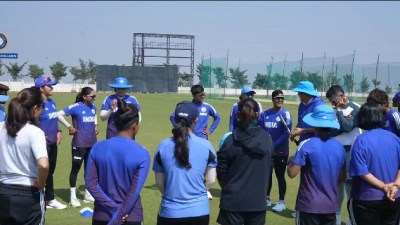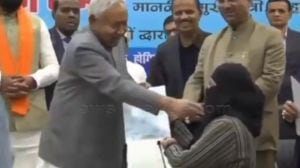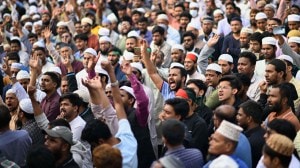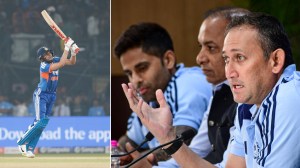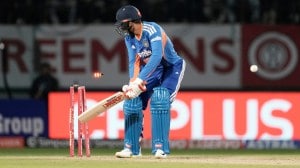Who is Abdul Karim ‘Tunda’, linked to 40 terrorist bombings, and now acquitted in one case?
Alleged Lashkar-e-Taiba operative Tunda was accused of playing a role in the train bomb blasts in major cities on December 6, 1993. He has now been acquitted in the case. What other charges has he faced over the years?
 Abdul Karim Tunda, after he was acquitted by a Terrorist & Anti-Disruptive Activities Act (TADA) court in the 1993 serial bomb blasts case, in Ajmer, Thursday, Feb. 29, 2024. (PTI Photo)
Abdul Karim Tunda, after he was acquitted by a Terrorist & Anti-Disruptive Activities Act (TADA) court in the 1993 serial bomb blasts case, in Ajmer, Thursday, Feb. 29, 2024. (PTI Photo)Alleged bomb expert and Lashkar-e-Taiba (LeT) operative Abdul Karim ‘Tunda’(80) was acquitted on Thursday (February 29) for blasts that took place on December 6, 1993, in trains at Lucknow, Kanpur, Hyderabad, Surat and Mumbai.
The Terrorist and Disruptive Activities (Prevention) Act (TADA) court that acquitted him in Ajmer, Rajasthan, sentenced other accused Irfan (70) and Hameeduddin (44) to life imprisonment. All three of them were lodged in a jail in Ajmer. In February 2023, a district and sessions court in Rohtak, Haryana, had acquitted Tunda for the 1997 double bomb blasts in the city.
Over the years, Tunda, who got his nickname after being maimed in a bombmaking accident, has been linked with around 40 terrorist blasts across the country. Who is Tunda, what were the charges against him, and what happened after he was taken into custody? We explain.
Tunda was born in Delhi’s Daryaganj, in a lower-middle-class family.
Tunda was born in 1943 at Chatta Lal Miya, in Old Delhi’s Daryaganj. Soon after his birth, his family shifted to their native village in Bazaar Khurd, Pilkhua, in Uttar Pradesh’s Ghaziabad. He worked as a carpenter, scrap dealer and cloth merchant, and was married with three children.
A change was marked in his life around the time of the Ram Janmabhoomi movement in the 1980s. Leaders from the Vishwa Hindu Parishad (VHP) and the BJP sought to mobilise support among Hindus for the construction of a Ram temple in Ayodhya. It was claimed that the site where the Babri Masjid stood was where Lord Ram was born.
Some of the towns and cities covered by the yatra on its route also saw communal riots take place in its wake. These events led to a change in Tunda’s worldview. Reportedly, his relatives were burned alive by mobs who targeted Muslim-run shops and a mosque. Tunda claimed that police had joined the mob in attacking Muslims.
In search of a response to the violence, he became associated with the neo-fundamentalist Ahl-e-Hadis sect. Tunda also travelled to Ahmedabad, where he began preaching Islam at a small seminary.
 Abdul Karim Tunda alias Abdul Quddooss, in New Delhi in 2013. (Express photo by Prem Nath Pandey)
Abdul Karim Tunda alias Abdul Quddooss, in New Delhi in 2013. (Express photo by Prem Nath Pandey)
Journey to Pakistan and towards LeT
Subsequently, he is believed to have been involved with the Pakistan government’s intelligence agency, the Inter-Services Intelligence (ISI), which helped him cross the border. Here, he underwent training in making improvised explosive devices. He was known as ‘Tunda’ (meaning handicapped) after he lost his left hand in a bomb-making accident.
He was alleged to have played a role in bombings following the Babri Masjid’s demolition in December 1992. The aftermath of the demolition saw some of the worst communal riots and violence in India, leaving thousands of people dead. The December 6, 1993 train blasts, which Tunda has now been acquitted for, happened on the first anniversary of the mosque’s demolition.
Over the years, Tunda was suspected of being involved in raising funds for the LeT in the Middle East and of having ties with gangster Dawood Ibrahim’s network. He had reportedly planned an attack during the Commonwealth Games in Delhi in 2010.
Further, he is believed to have scouted young recruits for the LeT. Tunda was among the 20 terrorists that India had asked Pakistan to hand over after the 26/11 attacks in Mumbai in 2008.
Caught at the India-Nepal border, chargesheeted but acquitted in many cases
Based on a tip-off, he was apprehended on August 16, 2013, on the India-Nepal border. The Special Cell of Delhi Police lodged around 20 cases against him and filed four chargesheets. These included blasts in Delhi (Sadar Bazaar in 1997, Karol Bagh in 1997).
However, three years later, the trial court gave Tunda a clean chit in the last of the cases. The court said the Special Cell had failed to produce any legally admissible evidence to put him on trial. Police then moved the Supreme Court in one case, in which Tunda was charged under TADA.
In 2017, he was pronounced guilty of the 1996 bomb blasts in Haryana’s Sonipat by a local court, under sections 307 (attempt to murder) and 120 B (conspiracy) of the IPC and the Explosives Act. The court awarded him the punishment of life imprisonment. Tunda later approached the Punjab and Haryana High Court with a criminal revision plea to commute his sentence.
- 01
- 02
- 03
- 04
- 05


